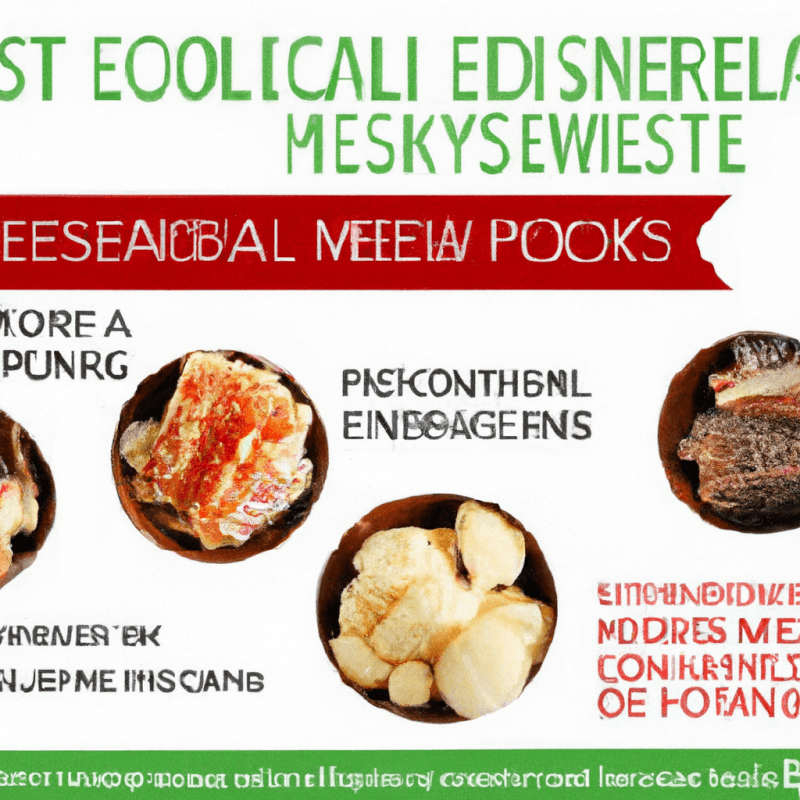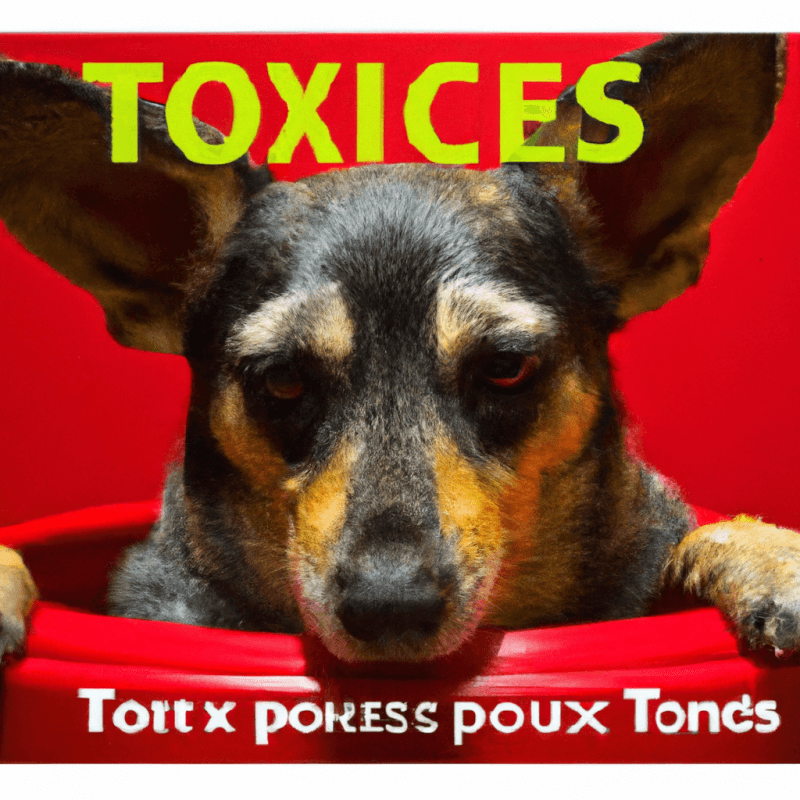Have you ever wondered which foods are safe for your furry friends to eat and which ones can be potentially harmful? In this article, we will explore the various foods that can be toxic to pets. From chocolate to grapes, onions to avocados, it’s important to be aware of these potential dangers to ensure the health and well-being of our beloved pets. So, grab a treat for yourself and join us as we uncover the dietary hazards that are best kept away from our furry companions.

Foods That Are Toxic to Dogs
Chocolate
Chocolate, a popular treat among humans, can be extremely toxic to dogs. This is because chocolate contains a substance called theobromine, which dogs are unable to metabolize as efficiently as humans. Theobromine poisoning can lead to symptoms such as vomiting, diarrhea, increased heart rate, tremors, seizures, and even death in severe cases. It’s important to keep chocolate and any products containing chocolate, such as cookies or cakes, out of your dog’s reach.
Ready for Cat Trivia?
Test your knowledge about cats!

Grapes and Raisins
Grapes and raisins may seem harmless, but they can actually be toxic to dogs. The exact substance in grapes and raisins that causes toxicity is unknown, but ingestion can lead to symptoms such as vomiting, diarrhea, abdominal pain, and kidney failure. Even small amounts of grapes or raisins can be dangerous for dogs, so it’s best to avoid giving them any of these fruits.
Onions and Garlic
Onions and garlic, whether raw, cooked, or in powdered form, can be harmful to dogs. These vegetables contain compounds that can cause damage to a dog’s red blood cells, leading to a condition called hemolytic anemia. Symptoms of onion or garlic toxicity in dogs may include weakness, pale gums, rapid breathing, and an increased heart rate. It’s important to be cautious and refrain from including these ingredients in your dog’s meals.
Avocado
While avocados are a delicious and nutritious fruit for humans, they can pose a risk to dogs. Avocados contain a substance called persin, which is toxic to dogs in large amounts. The highest concentration of persin is found in the leaves, bark, and seed of the avocado plant. Ingesting avocados can cause gastrointestinal upset in dogs, including vomiting and diarrhea. Additionally, the large pit can pose a choking hazard or lead to an intestinal blockage if swallowed.
Alcohol
Alcohol should never be given to dogs as it can have serious and potentially life-threatening effects. Dogs are much more sensitive to alcohol than humans, and even small amounts can cause intoxication. Symptoms of alcohol poisoning in dogs may include disorientation, stumbling, vomiting, diarrhea, depression, decreased coordination, and in severe cases, respiratory distress or coma. It’s essential to keep all alcoholic beverages out of your dog’s reach.
Caffeine
Similar to chocolate, caffeine contains theobromine, which is toxic to dogs. Caffeine can be found not only in coffee, but also in tea, energy drinks, soda, and certain medications. Ingesting caffeine can result in symptoms such as restlessness, increased heart rate, tremors, seizures, and even cardiac arrest in severe cases. It’s crucial to prevent your dog from accessing any caffeinated products to ensure their safety.
Xylitol
Xylitol is an artificial sweetener commonly found in sugar-free gum, candy, baked goods, and some medications. While harmless to humans, xylitol can be extremely toxic to dogs. When dogs ingest xylitol, it can cause a rapid release of insulin, leading to hypoglycemia (low blood sugar). Symptoms of xylitol poisoning in dogs may include vomiting, lethargy, loss of coordination, seizures, and in severe cases, liver failure. It’s crucial to be vigilant and check food labels to ensure the absence of xylitol when sharing treats with your dog.
Macadamia Nuts
Macadamia nuts are known to be toxic to dogs and can cause a variety of symptoms when ingested. These symptoms may include weakness, tremors, vomiting, increased body temperature, and an inability to walk properly. In most cases, the effects are temporary and dogs typically recover within a couple of days. However, it’s still important to prevent your dog from consuming macadamia nuts to avoid any potential complications.
Raw Dough
Raw dough, especially that containing yeast, can be hazardous to dogs. Yeast produces carbon dioxide gas as it ferments, causing the dough to rise. If a dog ingests raw dough, the heat and moisture of the stomach can cause the dough to continue rising, leading to bloating and potential gastric distress. Additionally, the consumption of raw dough can also lead to alcohol intoxication due to the fermentation process. It’s crucial to keep raw dough out of your dog’s reach and ensure they don’t consume any unbaked bread or pizza dough.
Fatty Foods
While fats are an essential part of a balanced diet for dogs, consuming excessive amounts of fatty foods can lead to pancreatitis. Pancreatitis is an inflammation of the pancreas and can cause symptoms such as vomiting, diarrhea, loss of appetite, abdominal pain, and lethargy. Foods that are particularly high in fat, such as fried foods, fatty cuts of meat, and buttery or greasy snacks, should be avoided for the well-being of your dog.
Foods That Are Toxic to Cats
Lilies
Lilies, specifically those from the Lilium and Hemerocallis species, are highly toxic to cats. These beautiful flowers contain compounds that can cause severe kidney damage, leading to kidney failure. Even small ingestions, such as licking the pollen off the fur, can have devastating consequences for cats. Symptoms of lily poisoning in cats may include vomiting, loss of appetite, lethargy, increased thirst, and in severe cases, seizures and death. It’s essential to keep lilies out of your cat’s environment to prevent accidental ingestion.
Onions and Garlic
Similar to dogs, onions and garlic are toxic to cats as well. These vegetables contain compounds that can damage a cat’s red blood cells, leading to anemia. Symptoms of onion or garlic toxicity in cats may include weakness, lethargy, pale gums, breathing difficulties, and a reduced appetite. To ensure the well-being of your cat, it’s important to keep all forms of onions and garlic away from their reach.
Alcohol
Alcohol should never be given to cats, as they are highly sensitive to its effects. Even small amounts of alcohol can cause intoxication in cats, leading to symptoms such as disorientation, depression, decreased coordination, and potentially respiratory distress or coma in severe cases. It’s crucial to ensure that all alcoholic beverages are inaccessible to your feline companion.
Caffeine
Cats are also susceptible to the toxic effects of caffeine. It’s important to keep products containing caffeine, such as coffee, tea, energy drinks, soda, and certain medications, away from your cat. Symptoms of caffeine poisoning in cats may include restlessness, rapid breathing, increased heart rate, tremors, and seizures. To prioritize your cat’s safety, it’s essential to prevent any accidental caffeine ingestion.
Chocolate
Just like with dogs, chocolate is toxic to cats as well. Theobromine, a substance found in chocolate, is metabolized slowly in cats, making them more susceptible to its effects. Chocolate ingestion can lead to symptoms such as vomiting, diarrhea, increased heart rate, tremors, seizures, and in severe cases, cardiac arrest. To protect your cat’s health, it’s crucial to keep all chocolate and chocolate-containing products out of their reach.
Grapes and Raisins
Grapes and raisins can be toxic to both dogs and cats. The exact substance in these fruits that causes toxicity is unknown, but ingestion can lead to symptoms such as vomiting, diarrhea, abdominal pain, and potential kidney failure. It’s important to avoid giving your cat any grapes or raisins to ensure their well-being.
Raw Meat and Fish
Raw meat and fish, including sushi, can pose a risk to cats. These uncooked foods can contain harmful bacteria and parasites, such as Salmonella, E. coli, or Toxoplasma, which can cause gastrointestinal upset or even more severe infections in cats. It’s important to ensure that any meat or fish given to your cat is properly cooked to eliminate these potential risks.
Milk and Dairy Products
Contrary to popular belief, milk and other dairy products may not always be well-tolerated by cats. Many cats are lactose intolerant, which means they lack the necessary enzyme to digest lactose properly. Consumption of milk or dairy products can lead to gastrointestinal upset in cats, including diarrhea and vomiting. It’s recommended to avoid offering milk or dairy treats to your cat unless they have shown no signs of lactose intolerance.
Bones
While it may seem natural to give a cat a bone to chew on, bones can actually be hazardous for their health. Bone splinters can cause choking, cuts, or blockages in the digestive tract. Furthermore, certain bones, especially cooked ones, can become brittle and easily break, posing additional risks to your cat. It’s best to provide your cat with appropriate, vet-approved chew toys instead of bones to ensure their safety.

Foods That Are Toxic to Both Dogs and Cats
Xylitol
As mentioned earlier, xylitol can be extremely toxic to dogs. However, it is also harmful to cats. Ingestion of xylitol in cats can cause a rapid release of insulin, leading to hypoglycemia. Symptoms of xylitol poisoning in cats may include vomiting, lethargy, loss of coordination, seizures, and potentially liver failure. To protect both your dog and cat, it’s essential to avoid sharing any xylitol-containing products with them.
Avocado
Avocados, as mentioned earlier, contain persin, which is toxic to both dogs and cats. The highest concentration of persin is found in the leaves, bark, and seed of the plant. Ingesting avocados can cause gastrointestinal upset in both dogs and cats, including vomiting and diarrhea. Additionally, the large pit can pose a choking hazard or lead to an intestinal blockage if swallowed. It’s best to avoid feeding avocados to your pets altogether.
Macadamia Nuts
Macadamia nuts are toxic to both dogs and cats, as mentioned earlier. Ingesting these nuts can cause weakness, tremors, vomiting, increased body temperature, and an inability to walk properly in both species. It’s important to prevent both dogs and cats from consuming macadamia nuts to avoid any potential complications.
Raw Dough
Raw dough can be hazardous to both dogs and cats for the reasons mentioned earlier. The heat and moisture in the stomach can cause the dough to rise, leading to bloating and potential gastric distress. Additionally, the fermentation process can lead to alcohol intoxication. It’s essential to keep raw dough away from both dogs and cats to ensure their well-being.
Fatty Foods
Consuming excessive amounts of fatty foods can lead to pancreatitis in both dogs and cats, as mentioned earlier. It’s crucial to monitor your pet’s fat intake and avoid feeding them high-fat foods. By doing so, you can help prevent any potential complications and maintain their overall health.

Foods That Are Hazardous to Birds
Chocolate
As mentioned earlier, chocolate can be toxic to birds. Theobromine, the substance found in chocolate, is also toxic to birds. Ingesting chocolate can lead to symptoms such as vomiting, diarrhea, increased heart rate, tremors, and even death in severe cases. It’s crucial to keep all chocolate products away from your feathered friends.
Coffee and Tea
Coffee and tea contain caffeine, which is toxic to birds. Birds are highly sensitive to the effects of caffeine and even a small amount can have severe consequences. Ingesting caffeine can lead to symptoms such as restlessness, increased heart rate, tremors, and seizures in birds. It’s important to ensure that your bird does not have access to any coffee or tea.
Avocado
Avocados, as mentioned earlier, are also toxic to birds. The persin found in avocados can be particularly harmful to them. Ingesting avocados can cause gastrointestinal upset in birds, leading to symptoms such as vomiting and diarrhea. It’s best to keep avocados away from your feathered companion.
Alcohol
Alcohol is toxic to birds and should never be given to them. Birds are highly sensitive to the effects of alcohol, even small amounts can cause intoxication. Symptoms of alcohol poisoning in birds may include disorientation, decreased coordination, depression, and in severe cases, respiratory distress or coma. It’s crucial to ensure that any alcoholic beverages are inaccessible to your bird.
Salt and Salty Foods
Excessive salt intake can be detrimental to a bird’s health. Birds have a delicate sodium balance, and consuming excessive salt or salty foods can disrupt this balance, leading to dehydration and potential kidney problems. It’s important to avoid providing birds with salty snacks or food that contains high levels of salt.
Onions and Garlic
Onions and garlic, as mentioned earlier, are toxic to birds as well. These vegetables contain compounds that can cause damage to a bird’s red blood cells, leading to anemia. Symptoms of onion or garlic toxicity in birds may include weakness, lethargy, and difficulty breathing. It’s essential to ensure that your bird does not have access to any form of onions or garlic.
Fruits with Seeds or Pits
While fruits are generally a healthy addition to a bird’s diet, certain fruits with seeds or pits can be hazardous. Seeds or pits from fruits such as apples, cherries, plums, and peaches can pose a choking hazard or cause intestinal blockages if ingested by birds. It’s important to remove all seeds or pits from these fruits before offering them to your feathered friend.
Fatty Foods
Foods that are high in fat, such as fried foods, buttery snacks, or greasy treats, should be avoided for birds. Excessive fat consumption can lead to obesity and other health issues in birds. It’s important to provide your bird with a balanced diet that consists of appropriate fruits, vegetables, and bird-specific pellets or seeds.
Mushrooms
Mushrooms should be avoided for birds as they can be toxic. Many wild mushrooms can be toxic to birds, causing symptoms such as vomiting, diarrhea, difficulty breathing, tremors, and even death. It’s best to refrain from offering mushrooms to your feathered companion and stick to safe, bird-friendly foods.
Nutmeg
Nutmeg is a spice commonly used in baking, but it can be toxic to birds. Ingesting nutmeg can cause symptoms such as gastrointestinal upset, tremors, seizures, and potentially even hallucinations in birds. It’s crucial to ensure that your bird does not have access to any nutmeg, whether in whole or powdered form.

Foods That Are Dangerous to Small Animals
Chocolate
As mentioned earlier, chocolate is toxic to small animals as well. Ingesting chocolate can lead to symptoms such as vomiting, diarrhea, increased heart rate, tremors, and in severe cases, even death. It’s crucial to keep all chocolate and chocolate-containing products away from small animals to ensure their safety.
Caffeine
Caffeine, as mentioned earlier, is toxic to small animals too. Small animals, such as rabbits, guinea pigs, or hamsters, are highly sensitive to the effects of caffeine. Symptoms of caffeine poisoning in small animals may include restlessness, increased heart rate, tremors, seizures, and in severe cases, cardiac arrest. It’s important to prevent any accidental caffeine ingestion by keeping all caffeinated products out of their reach.
Onions and Garlic
Onions and garlic, as mentioned earlier, can be harmful to small animals as well. These vegetables contain compounds that can cause damage to small animals’ red blood cells, leading to anemia. Symptoms of onion or garlic toxicity in small animals may include weakness, pale gums, rapid breathing, and an increased heart rate. To ensure their well-being, it’s important to avoid giving small animals any foods that contain onions or garlic.
Xylitol
Xylitol, as mentioned earlier, can be extremely toxic to small animals. Ingesting xylitol can cause a rapid release of insulin, leading to hypoglycemia (low blood sugar). Symptoms of xylitol poisoning in small animals may include vomiting, lethargy, loss of coordination, seizures, and potentially liver failure. It’s crucial to prevent any accidental xylitol ingestion by checking food labels and avoiding sharing treats containing xylitol with small animals.
Pure Almonds
While many nuts can be a healthy addition to a small animal’s diet, pure almonds should be avoided. Almonds, especially the bitter varieties, contain substances that can be toxic to small animals. Ingesting almonds can lead to symptoms such as vomiting, diarrhea, and potentially even cyanide poisoning in severe cases. It’s best to err on the side of caution and avoid feeding small animals almonds.
Macadamia Nuts
Macadamia nuts, as mentioned earlier, are toxic to small animals as well. Ingesting these nuts can cause weakness, tremors, vomiting, increased body temperature, and an inability to walk properly in small animals. To prevent any potential complications, it’s important to keep macadamia nuts out of reach for small animals.
Fruits with Seeds or Pits
Fruits with seeds or pits, such as apples, cherries, plums, and peaches, can pose a choking hazard or cause intestinal blockages in small animals. It’s crucial to remove all seeds or pits from these fruits before offering them to small animals to ensure their safety.
Citrus Fruits
While small amounts of citrus fruits may be tolerated by some small animals, it’s best to avoid feeding them to small animals altogether. Citrus fruits, such as oranges, lemons, and limes, contain high levels of citric acid, which can cause gastrointestinal upset in small animals and may even lead to mouth sores. It’s recommended to stick to other safe and suitable fruits for small animals.
Rhubarb
Rhubarb is a plant commonly used in baking, but it can be toxic to small animals. Ingesting rhubarb can cause symptoms such as vomiting, diarrhea, tremors, and potentially even kidney damage in small animals. It’s important to ensure that small animals do not have access to rhubarb plants or any food that contains rhubarb.
Mushrooms
Mushrooms, as mentioned earlier, can be toxic to small animals as well. Ingesting wild mushrooms can cause symptoms such as vomiting, diarrhea, difficulty breathing, tremors, and even death in small animals. To ensure their safety, it’s best to avoid offering any mushrooms to small animals and stick to safe, vet-recommended foods.

Foods That Are Harmful to Fish
Processed Foods
Processed foods, such as chips, crackers, or breaded snacks, should be avoided when feeding fish. These foods can contain additives, preservatives, or high levels of sodium that can be harmful to fish. Additionally, processed foods may lack the necessary nutrients for optimal fish health. It’s best to provide fish with a balanced diet consisting of appropriate fish pellets or flakes.
Raw Meat
Raw meat can be hazardous to fish. Raw meat may contain harmful bacteria or parasites that can cause illness or infections in fish. It’s important to properly cook any meat before feeding it to fish to eliminate these potential risks.
Salt
Salt, in excessive amounts, can be harmful to fish. Some fish species are more sensitive to salt than others, and adding salt to their environment can lead to stress and potential health problems. It’s crucial to research the specific needs of the fish species you have and ensure that the salinity levels in their tanks or ponds are appropriate.
Onions and Garlic
Onions and garlic, as mentioned earlier, are harmful to fish as well. These vegetables contain compounds that can damage a fish’s red blood cells, potentially leading to anemia. To ensure the well-being of your fish, it’s important to avoid including onions or garlic in their diet.
Citrus Fruits
Citrus fruits, such as oranges, lemons, and limes, should be avoided when feeding fish. Citric acid found in these fruits can disrupt the pH balance of the water, potentially causing stress or harm to the fish. It’s best to offer fish other suitable food options.
Spoiled Food
Spoiled food, whether it is meat, vegetables, or any other type of food, should never be fed to fish. Spoiled food can contain harmful bacteria or toxins that can cause illness or even death in fish. It’s crucial to ensure that the food provided to fish is fresh and safe for consumption.
Foods High in Fat
Foods high in fat, such as fatty cuts of meat or greasy snacks, should be avoided when feeding fish. Excessive fat intake can lead to health problems in fish, including digestive issues and fatty liver disease. It’s important to provide fish with a balanced diet that includes appropriate portions of protein, vegetables, and other suitable food options.
Sweets and Sugary Treats
Sweets and sugary treats should never be fed to fish. Fish do not possess the necessary enzymes to process or digest sugar effectively, and consuming sugary food can lead to health issues, such as obesity or even diabetes. It’s best to stick to a diet that is specific to the nutritional needs of the fish species you have.
Bread
While small amounts of bread may be tolerated by some fish, it’s important to avoid feeding them excessive amounts. Bread lacks the necessary nutrients for fish and can cause digestive issues or constipation if eaten in large quantities. It’s best to provide fish with a balanced diet that includes appropriate fish pellets or flakes.
Drinks Containing Caffeine
Drinks containing caffeine, such as coffee, tea, soda, or energy drinks, should never be given to fish. Caffeine is a stimulant that can have serious effects on fish, including rapid heartbeat, increased stress, and potentially even death. It’s crucial to ensure that any drinks containing caffeine are kept far away from fish and their habitats.


